[unable to retrieve full-text content]
Genius English Translations – RM - Yun ft. Erykah Badu (English Translation) GeniusSaturday, December 3, 2022
Secretary Antony J. Blinken with Thomas Sotto of France 2 - United States Department of State - Department of State - Translation

Via Translation
QUESTION: Good afternoon, Antony Blinken.
SECRETARY BLINKEN: Good afternoon.
QUESTION: Thank you for giving a little bit of your time, which I know is very precious, for Télématin and for the viewers of France 2. Thank you also for doing this interview in French, which is a language you master perfectly. You lived in Paris for many years.
Emmanuel Macron is on a state visit here in the United States, a warm state visit. Yet, if you look in the rearview mirror over the last 20 years, the relationship between our two countries has not always been simple. There have been disagreements on Iraq, there have been disagreements on Syria, on the climate crisis during Donald Trump’s time, on the Australian submarine contracts that you have somewhat stolen, it must be said. How would you characterize the relationship between our two countries today?
SECRETARY BLINKEN: Quite frankly, excellent. And that’s mostly because we don’t look in the rearview mirror. We’re looking straight ahead, and we both see that we have a deep interest in doing what we’ve been doing for years, which is working together on issues that impact the lives of our citizens.
Neither France nor the United States has the capacity, alone, to act effectively on these issues, whether it be climate, whether it be global health, whether it be all the new technologies, the necessary investments in infrastructure – on all these levels, we both need to work together.
QUESTION: There is a topic that is kind of upsetting people about the economy, at the moment. It is said that you are very protectionist, and Emmanuel Macron said: it is a choice that risks fragmenting the West. Is there a way to negotiate on this or not? On the Act on inflation…
SECRETARY BLINKEN: There was a very good conversation between the presidents today on this issue. We have the same goals. We both have to face the climate challenge. To do that, one of the things we need to do is invest in new technologies and energy that is conducive to dealing with this challenge. We want to do it in a way that creates jobs, but not only jobs –
QUESTION: You want to create jobs and attract everyone in the United States?
SECRETARY BLINKEN: Exactly, we agree that we need to do it in a way that creates jobs here, yes, but jobs in Europe; jobs here, but not at the expense of what’s happening in Europe. And the two presidents have agreed to work with the European Union to synchronize our approaches.
QUESTION: Our two countries, France and the United States, are very involved in the war in Ukraine in the face of Russian aggression. Just this week, you announced $400 million in American aid to the Ukrainians. It’s been more than nine months now since this war started. Do you see a way out of it, Antony Blinken?
SECRETARY BLINKEN: I would like to, but it depends entirely on decisions made by Moscow, by President Putin. This war could end tomorrow if Putin stops. In a sense, it’s very simple: he must stop what he started. But, apart from that, what is needed – both presidents are in full agreement, is to continue our support for Ukraine, for the Ukrainian people, both in terms of economic and humanitarian security.
But of course, what is Putin doing right now? Even though he sometimes says he’s ready for diplomacy, he’s attacking the civilian infrastructure in Ukraine.
QUESTION: He’s playing the cold card.
SECRETARY BLINKEN: He’s playing the cold card. He’s weaponizing winter.
QUESTION: So, Antony Blinken, do you think it’s time for Vladimir Putin and Volodymyr Zelensky to talk? Has this time come? Has the time for dialogue and direct conversation come?
SECRETARY BLINKEN: If we saw Putin was serious about diplomacy and dialogue, yes. The problem is, he’s doing just the opposite. He’s inciting now to escalate things.
QUESTION: So, dialogue is impossible today?
SECRETARY BLINKEN: If there is a seriousness on the Russian side, dialogue is always possible. We’re always open to that. Zelensky, the president, has made it clear that at the end of the game, there’s going to have to be negotiation, diplomacy. We think exactly the same thing. Moreover, President Zelensky has put forward a plan to bring about an end to the war. For the moment, Putin is not on board. It depends on him.
QUESTION: Do you still have contacts? Do you have contacts with Russia and with the Russians, which are not necessarily official?
SECRETARY BLINKEN: Yes, we have contacts. We have contacts, especially if there are important moments when we have to talk. For example, there was contact with Russia because there was a fear that they might use a nuclear weapon, which would be catastrophic for…
QUESTION: Is that a fear for you?
SECRETARY BLINKEN: It’s a fear. I wouldn’t say we haven’t seen a specific movement on that, but it’s still a fear in an emergency for them, exactly.
QUESTION: You don’t rule it out, do you?
SECRETARY BLINKEN: We’re not ruling it out, but more importantly, it’s not just us. You even have Xi Jinping in China who has made statements on this. Other leaders who have made, who have said very clearly to Putin, don’t go there.
QUESTION: Are you concerned that this could lead to a third world conflict, or are we playing scare tactics?
SECRETARY BLINKEN: No, for President Biden, it’s critical that we avoid expanding the conflict. On the contrary, we want to bring it to an end, but above all, we don’t want to expand it. We don’t want a war with Russia. We do not want a third world war. That’s not what we want at all. On the other hand, what we need for peace: it must not be only on paper, the peace, but it must be fair, so with the principles of the UN charter. And it must be sustainable, because, in a sense, there is no point in making a false peace that will be rejected very quickly and Russia goes to war again. What we have to avoid, for example, is the idea that we freeze things in place. Russia in this context will never negotiate the territories that were taken by force.
QUESTION: What is the scope? We have to go back to the pre-February 24 borders or even Crimea?
SECRETARY BLINKEN: That’s Ukraine’s decision.
QUESTION: Okay.
SECRETARY BLINKEN: We don’t make decisions for Ukraine. We’re going to support Ukraine’s decisions.
QUESTION: Let’s imagine, Antony Blinken, that this war finally ends tomorrow. Would Vladimir Putin automatically become an interlocutor for the United States again?
SECRETARY BLINKEN: Uh, really, I can’t speculate. What he’s done is very difficult for everyone to digest. The most important thing now is to end this war, but in a fair and lasting way. After that, we’ll see.
QUESTION: Do you fear that the post-Putin era will be even worse than Putin? I am thinking in particular of Yevgeny Prigozhin, the formidable founder of the Wagner militia. Does that worry you?
SECRETARY BLINKEN: You know that for us… What’s important is not the personalities, it’s the policy that Russia will follow. So, having, you know — and President Biden said it earlier, President Putin has miscalculated very badly on Ukraine. Everything he tried to avoid, he precipitated. In the West, we are not divided. On the contrary, we are united and unified. Ukraine is more united than ever. What we see in Russia is catastrophic for Russia. More than a million Russians have left. It may be good for Putin because it’s the very people who might be opposed to him, but it’s catastrophic for Russia and for its future.
QUESTION: There are also demonstrations in China in reaction to Xi Jiping’s authoritarian policies under the guise of fighting Covid. Does that make you happy in the name of democratic values or does it worry you?
SECRETARY BLINKEN: You know, the fact that people are demonstrating, that they’re trying to express their frustrations, obviously we support that, whether it’s in China, whether it’s in Iran, whether it’s wherever you want.
QUESTION: You support the protesters.
SECRETARY BLINKEN: We support their freedom to express themselves and to show their frustrations. At the same time, if there is a crisis, if there is a problem with Covid in China, we are not happy at all. On the contrary, for us, it would be a very good thing if China could find a way to deal with this problem, both for the Chinese people, but also for everyone.
QUESTION: But do you think that this unrest, these demonstrations that we’re not used to, can rock the regime?
SECRETARY BLINKEN: I can’t make a prediction. Is it — for us, what we want to see is: what are the desires of the Chinese people, and do they have the capacity to express their desires? Does the political system have the capacity to respond to the wishes of the Chinese people?
QUESTION: You could support the wishes of the Chinese people?
SECRETARY BLINKEN: Of course. But what we must look at is what is the path that China will take in the face of Covid, and we want China to be successful because it’s bad not only for the Chinese people, it’s bad for everybody – the global economy. There are consequences for the global economy when China shuts down.
QUESTION: You have a trip planned there in January, in a month. Is that trip still on?
SECRETARY BLINKEN: Yes, we’re going to China early next year. Whether it’s January or February, we’re not sure yet, but it’s based on a conversation that President Biden had with President Xi Jinping at the G20 a few weeks ago.
QUESTION: And then there’s Iran, which has also been in a state of rebellion for the past few weeks, since the death in September of Mahsa Amini, the young woman who was arrested by the morality police and eventually killed. Men are now starting to join protest movements there. And then, there was that image you must have seen, of the Iranian soccer team refusing to sing the Iranian anthem in the first games in support of the protesters. What does that image mean to you, Antony Blinken?
SECRETARY BLINKEN: I’m inspired mainly by the fact that, since the death of Mahsa Amini, we have seen this extraordinary demonstration of the will of the Iranian people to express themselves, led by women, led by young people. This too is something we support.
But we must be very clear on this. The subject is not us, the United States. It’s not the West. France is not the subject. It’s the Iranian people and it’s their desire to be able to express themselves freely, and that’s what we support. Moreover, we are trying to –
QUESTION: Would you say that Iran, the Iranian regime, is a threat to the world or to the equilibrium of the world today?
SECRETARY BLINKEN: What we’re seeing, both in the region itself and then even beyond that, because we’re seeing for example [inaudible] of armaments to Russia for aggression in Ukraine –
QUESTION: Iran is supporting Russia.
SECRETARY BLINKEN: Iran is not only supporting, but supporting with drones that are killing Ukrainian civilians, as we speak – and trying to destroy their infrastructure. So, it’s a threat in that sense. It is a threat in the region, supporting terrorist groups, supporting groups that destabilize countries. So, I think that here too, France and the United States are in complete agreement on the need to face this challenge, but obviously –
QUESTION: Could there be a joint response one day?
SECRETARY BLINKEN: There are already joint responses. We have worked together. We still do on the nuclear issue.
QUESTION: Yes.
SECRETARY BLINKEN: We are in full agreement.
QUESTION: A military response?
SECRETARY BLINKEN: And we’re also working on how to deal with the security challenge posed by Iran.
QUESTION: All these people, these populations, the Iranians, the Chinese, we could add those who fight for the defense of human rights in Qatar, they need social networks to express themselves. Is Elon Musk’s Twitter working for you?
SECRETARY BLINKEN: We will have to see what the facts are. Again, it’s not about a person, it’s about –
QUESTION: We’re starting to see, though –
SECRETARY BLINKEN: We’ll see in the weeks and months to come. This is obviously a very important platform worldwide. We hope that this platform is a space where people can express themselves but not with false information, disinformation.
QUESTION: He will have to apply the European rules on content moderation, otherwise Twitter could even be banned in Europe. That’s what the European Commission said today. Are you on the same page?
SECRETARY BLINKEN: For us, it’s important to do everything possible to maintain the free exchange of expression and information. It’s the first amendment. We take that very seriously, but we have to deal with this problem that we both face: how to deal with spaces where misinformation wins the game.
QUESTION: You have two Twitter accounts, one is your Secretary of State account and the other one, personal.
SECRETARY BLINKEN: Yes.
QUESTION: Did you pay, will you pay the eight euros for the subscription fee or not?
SECRETARY BLINKEN: (Laughs) I’m going to ask my staff if they paid for — uh — with the State Department. We’ll see how.
QUESTION: We’re going to stay in the United States. How is your President Joe Biden really doing? Because there’s some concern that he’s tired, a little bit absent, a little bit disconnected. Is there a little bit of concern there, or not?
SECRETARY BLINKEN: (Laughs) I have a hard time keeping up with him because he’s always ten steps ahead of me, both physically, but also in terms of ideas. He has not only – how could I say it – an enormous amount of physical energy, but also an enormous amount of intellectual energy.
QUESTION: So, you’re not worried.
SECRETARY BLINKEN: Not at all, on the contrary. My only concern is being able to keep up with him, myself.
QUESTION: All right, then. Let’s talk about you. You’re 60 years old. You’re young.
SECRETARY BLINKEN: Yes.
QUESTION: You’ve been in all the most strategic positions in the United States for over 20 years. When you shave in the morning, do you ever think about the presidency of the United States?
SECRETARY BLINKEN: (Laughs) Oh, not at all!
QUESTION: Never?
SECRETARY BLINKEN: No. You know, I’m incredibly lucky to be able to do this job.
QUESTION: Yes.
SECRETARY BLINKEN: I have spent almost 30 years in foreign policy. So, to be able to have the opportunity for a few years to do this job, and especially here at the State Department where I started, almost 30 years ago, for me, it’s really all I could have wanted.
QUESTION: We’re coming to the end of this interview, Antony Blinken. Seen from Europe, we sometimes have the impression that we are at the end of a world, with the wars we have talked about; the environmental alert that seems more and more irreversible; with the set back of fundamental rights that also concerns you; with the set back of the right to an abortion. How do you manage to remain optimistic? How do you manage to keep the faith?
SECRETARY BLINKEN: It’s true that this is a period, an inflection point, where the world we knew, the post-Cold War world, is over. And there is a competition to define who will follow and what will follow.
QUESTION: Are you worried about your children?
SECRETARY BLINKEN: What gives me hope, I’ll tell you, is precisely what happened today with France, with our allies, because the challenge for President Biden was to renew our alliances, to energize our partnerships, precisely because we’re convinced that, on all these issues, we need to work together. We need to find cooperation, and we need to demonstrate that democracies can deliver. This is precisely what we are doing with France.
QUESTION: For my very last question, let’s go back to soccer, the World Cup.
SECRETARY BLINKEN: (Laughs)
QUESTION: You have a double culture, American and also French. Really, who do you support? The United States or les Bleus?
SECRETARY BLINKEN: I support the U.S. team, but –
QUESTION: Ah!
SECRETARY BLINKEN: If the U.S. team doesn’t make it, and if France is still in the game, Allez les Bleus!
QUESTION: Ah, very good! Thank you very much, Antony Blinken, for giving us a little bit of your time. Thank you very much.
SECRETARY BLINKEN: Thank you.
Friday, December 2, 2022
Genius English Translations – RM - 들꽃놀이 (Wild Flower) ft. youjeen (English Translation) - Genius - Translation
[unable to retrieve full-text content]
Genius English Translations – RM - 들꽃놀이 (Wild Flower) ft. youjeen (English Translation) GeniusExpansion in North American market: JR Language opens office in Mexico - PR Web - Translation
Today is an important day for our firm and for our clients. This opening will help us better serve our clients’ needs in Mexico. As we grow our international coverage, we know that our local presence is key to understanding and satisfying the growing need for translation services.
MEXICO CITY (PRWEB) December 02, 2022
JR Language has been helping clients in North America maximize their global strategy for more than 15 years with solutions that help them reach more customers around the world. By helping clients keep their content relevant in more than 100 languages JR Language translation company ensures their customers, employees and stakeholders do not have a language barrier. By increasing its presence in Mexico, JR Language is adding resources to support to its clients in the country.
The JR team supports companies with their multilingual websites, e-Learning, legal document translations, marketing translation, human resource documents, compliance document translation, and automotive and technical translation.
JR clients have a seamless workflow to manage translations from a single location via the Translation Portal, which allows them to request translations, track key information and receive deliveries all from one place, having full visibility over translation costs.
Rafael Suarez, Managing Director JR Language Mexico, comments on the expansion: “Today is an important day for our firm and for our clients. This opening will help us better serve our clients’ needs in Mexico. As we grow our international coverage, we know that our local presence is key to understanding and satisfying the growing need for translation services.”
JR Language’s office is located at:
Blvd Parque Centro 1440, Edificio Maia A
Colonia Los Parques 25279
Saltillo, Coah., México
Phone number +52 81 218 80185
JR Language (jrlanguage.com.mx) provides multilingual solutions to help companies grow worldwide and communicate globally with clients, employees, and partners in more than 100 languages. The company offers a complete set of solutions including interpretation services and expertise in translating documents, websites, software, and videos. JR Language is a one-stop translation agency.
Share article on social media or email:
The Dictionary of Lost Words by Pip Williams – The Stute - The Stute - Dictionary
The word ‘Bondmaid’ was discovered missing from the first Oxford English Dictionary. This is the story of the girl who stole it. Esme is born into a world of words; she spends her childhood in the ‘Scriptorium,’ a garden shed in Oxford where her father and a team of dedicated lexicographers are collecting words for the Dictionary. As a child, Esme’s place is beneath the sorting table, unseen and unheard. One day a slip of paper containing the word ‘bondmaid’ flutters to the floor. Esme rescues the slip and stashes it in an old wooden case that belongs to her friend, Lizzie, a young servant. Esme begins to collect other words from the Scriptorium that are misplaced, discarded, or neglected by the dictionary men. Over time, Esme realizes that some words are considered more important than others and that words and meanings relating to women’s experiences often go unrecorded. While she dedicates her life to the Oxford English Dictionary, secretly, she begins to collect words for another dictionary: The Dictionary of Lost Words. The Dictionary of Lost Words reveals a lost narrative: the narrative of women’s involvement in the dictionary and the significance of the women’s suffrage movement.
As this novel was set during the fight for women’s suffrage, there were many themes of female equality and empowerment. There was one woman, Tilda, who embodied these ideals throughout the novel. She was a suffragette who inspired and pushed Esme to contribute and face the oppression in her own way. Additionally, there were so many women who actually contributed to the real Oxford English Dictionary who were brought to life in this novel, which is empowering to learn about. Although women have been overlooked at many points in history, they always had an impact.
A theme that was commonly threaded throughout the novel was belonging. Esme constantly looked for her purpose and the place where she fit in while doing what she loved. She had many obstacles throughout the novel, as all protagonists do and as we all do in life, but eventually, she found her way and overcame all that she went through in the process. I thought that her journey and growth as a person were relatable and inspiring.
Finally, family played an important role in this novel—even unconventional family. The people who are there to support you in the darkest times are your family too. Esme always had her Da, but because she was motherless, she had other maternal figures in her life, like Ditte—her father’s friend—and her friend, Lizzie. Throughout the novel, they were there for her by giving her advice and comfort when she needed it most.
I loved how fiction was woven into history in the novel. A big premise of the book was that Esme stole the word ‘bondmaid,’ and if you actually look in the originally published dictionary, the word bondmaid is missing. Additionally, almost all of the characters were actual people who helped edit the Dictionary, and I love whenever historical fiction novels do that. This book was very well written and honestly very educational as well. If you just love historical fiction this is a good one because it’s not a common history timeline that we learn about. If you have an interest in words and linguistics, this is definitely an interesting fiction read.
Thursday, December 1, 2022
‘Return to Seoul’ Review: Found in Translation - The New York Times - Translation
[unable to retrieve full-text content]
‘Return to Seoul’ Review: Found in Translation The New York TimesHow to add new words to the iPhone autocorrect dictionary - TrustedReviews - Dictionary
If your iPhone keeps annoyingly over-correcting your text input, here’s how to solve the problem by adding new words to your dictionary.
Let’s say you’re sending your friend a text using an abbreviation or slang term. It might seem normal enough to you, but if your iPhone’s dictionary doesn’t recognise the word, then it might replace your friendly jargon with an official word that often doesn’t have the same meaning. This is frustrating, but fortunately you can change this state of affairs by adding a new word to the iPhone dictionary; this article explains how, in just a few simple steps.
What you’ll need:
- We used an iPhone 13, but you can use any iPhone
The Short Version
- Open the Settings app
- Scroll down to General
- Tap on Keyboard
- Select Text Replacement
- Tap the + symbol at the top right
- Enter your word
- Your new word is now in your iPhone’s dictionary
How to add new words to the iPhone autocorrect dictionary: Step-by-step
-
Step
1Open the Settings app
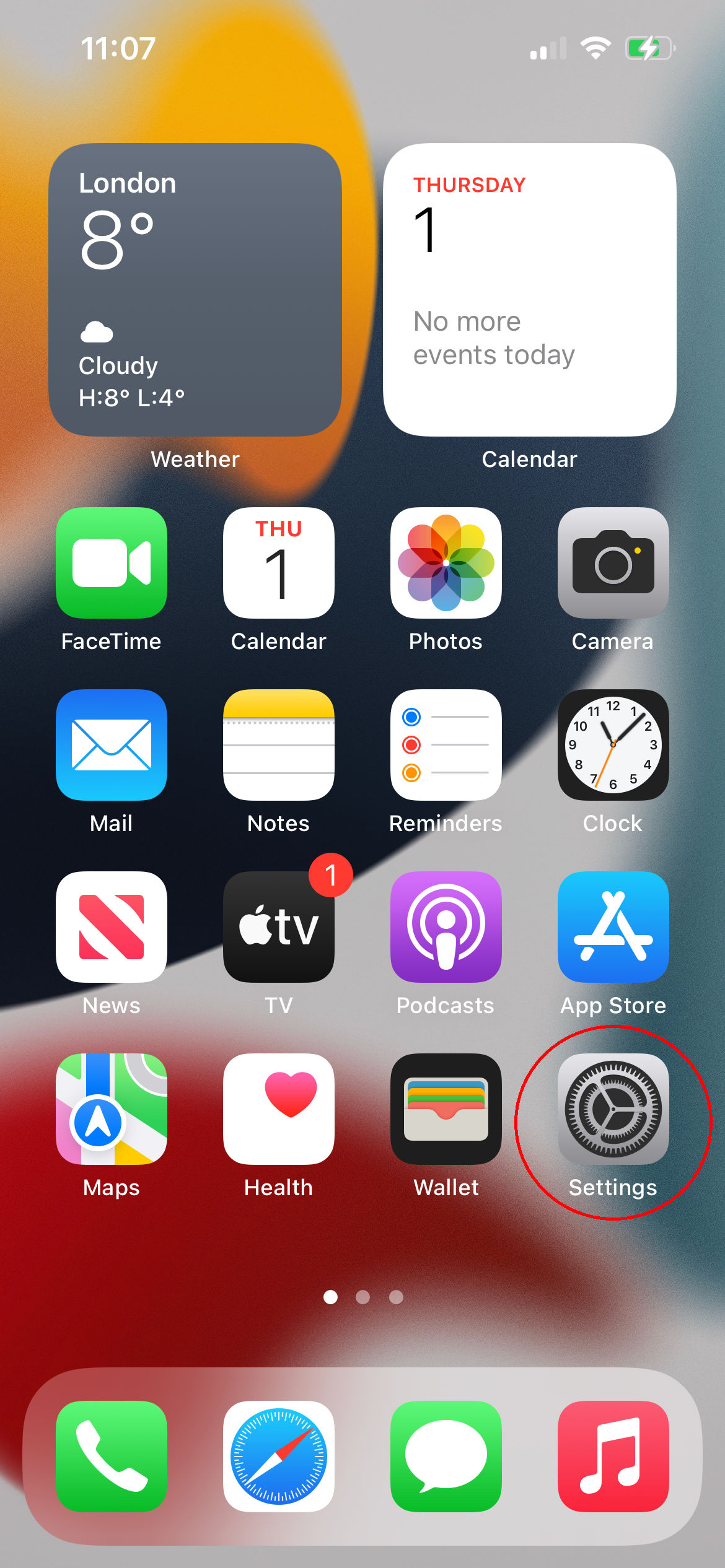
To start with, tap on your phone’s Settings app. This is the one with a mechanical cog as its icon.

-
Step
2Scroll down to General
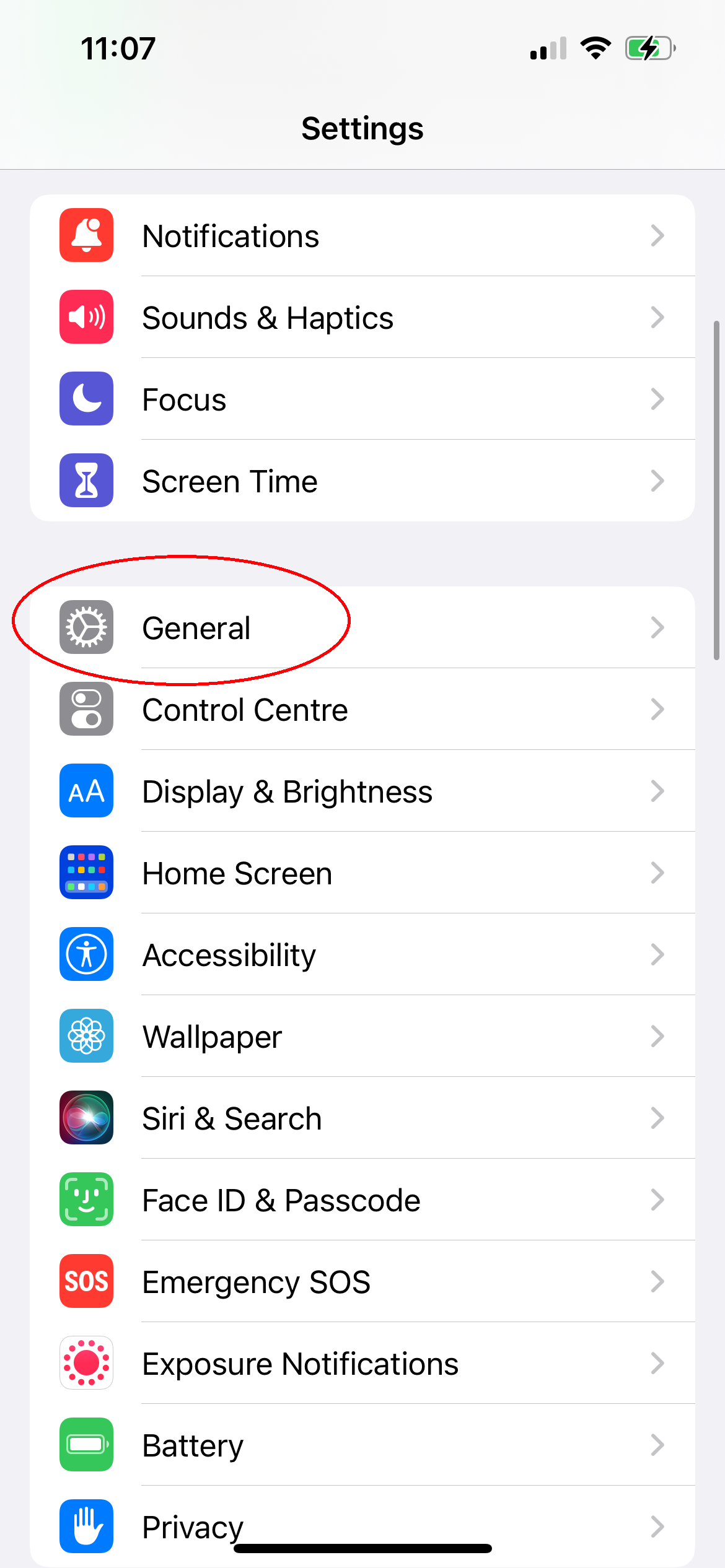
In the Settings menu, scroll down to ‘General’ and tap on it

-
Step
3Tap on Keyboard
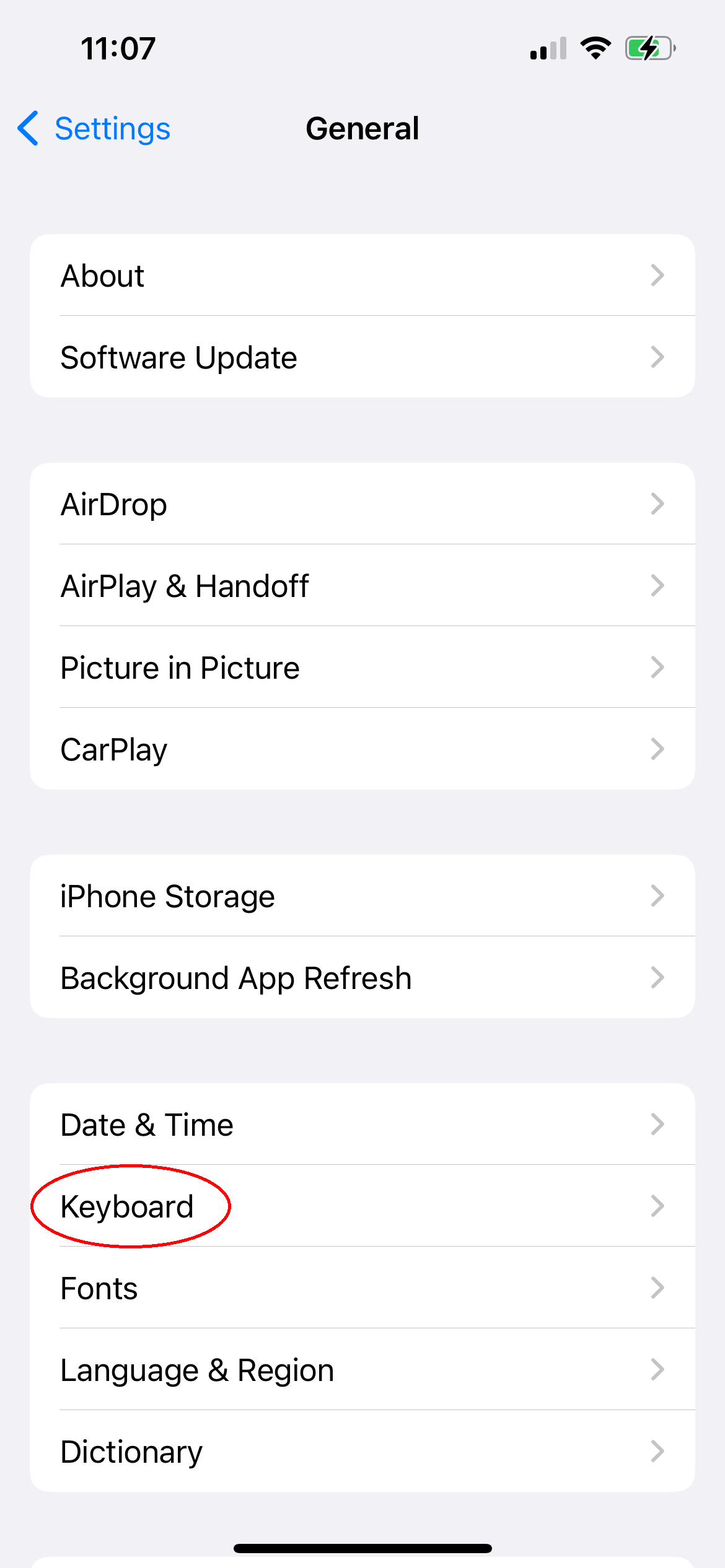
Now tap on the option reading ‘Keyboard’

-
Step
4Select Text Replacement
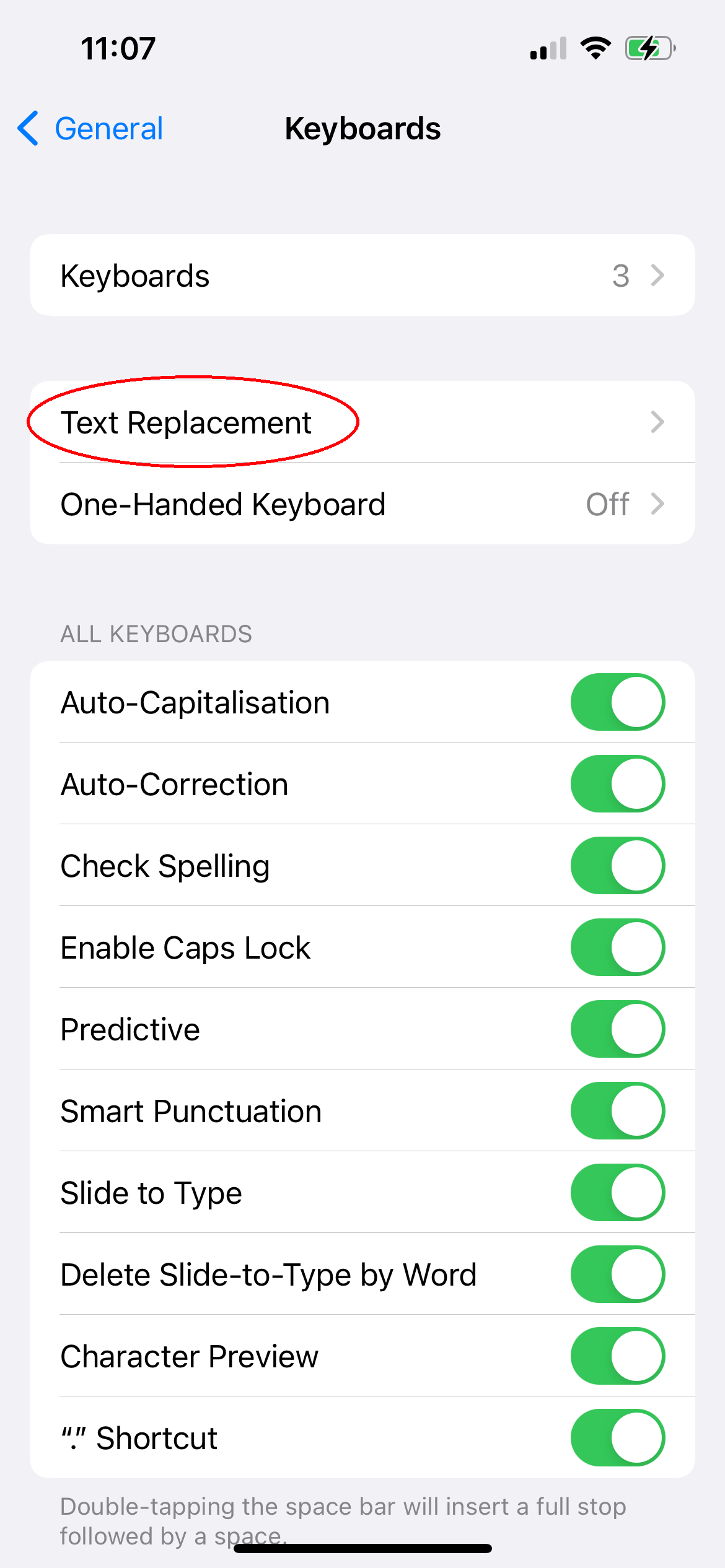
In the Keyboard menu, tap on ‘Text Replacement’

-
Step
5Tap the + symbol at the top right
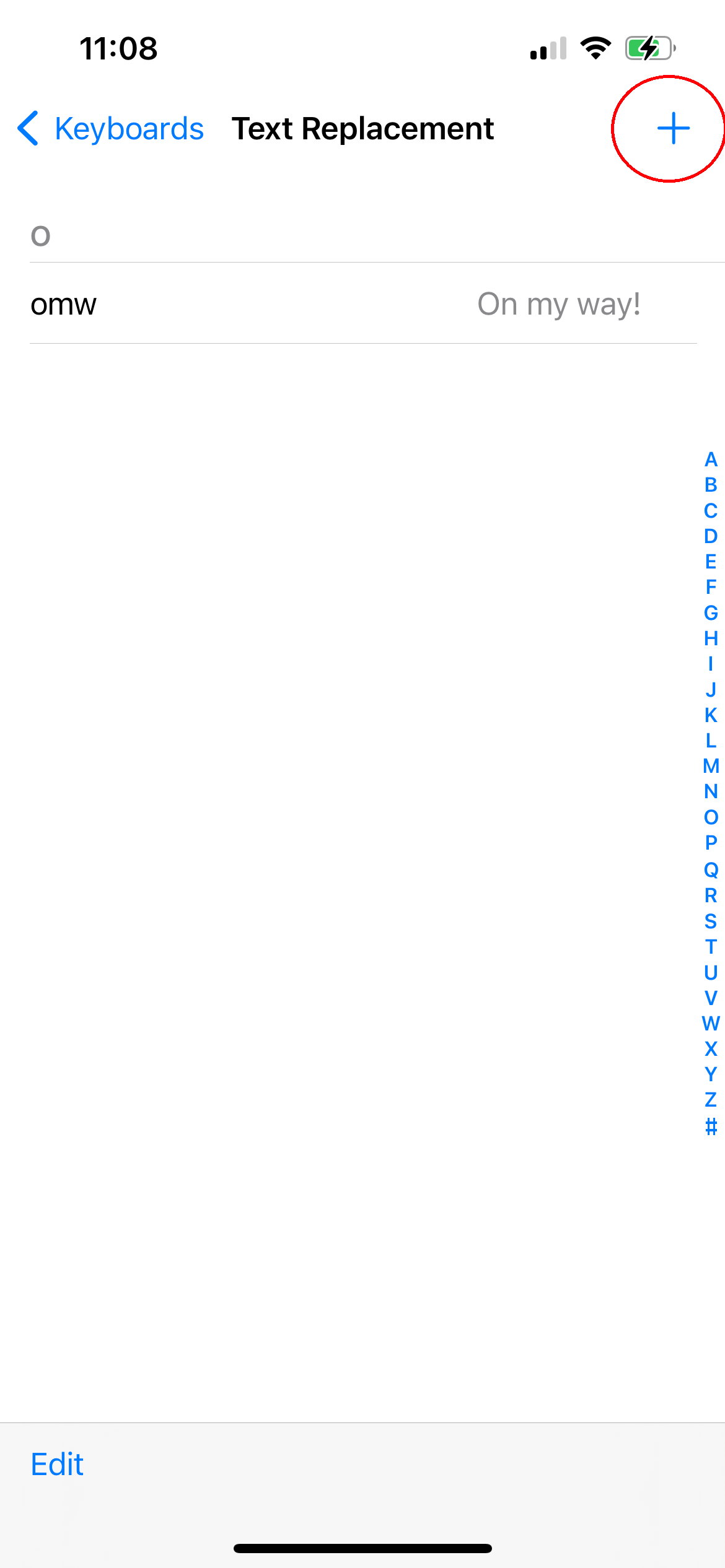
Now tap on the + symbol that’s at the top-right corner of the screen

-
Step
6Enter your word

Type your new word, and save it by tapping the ‘Save’ button at the top right

-
Step
7Your new word is now in your iPhone’s dictionary
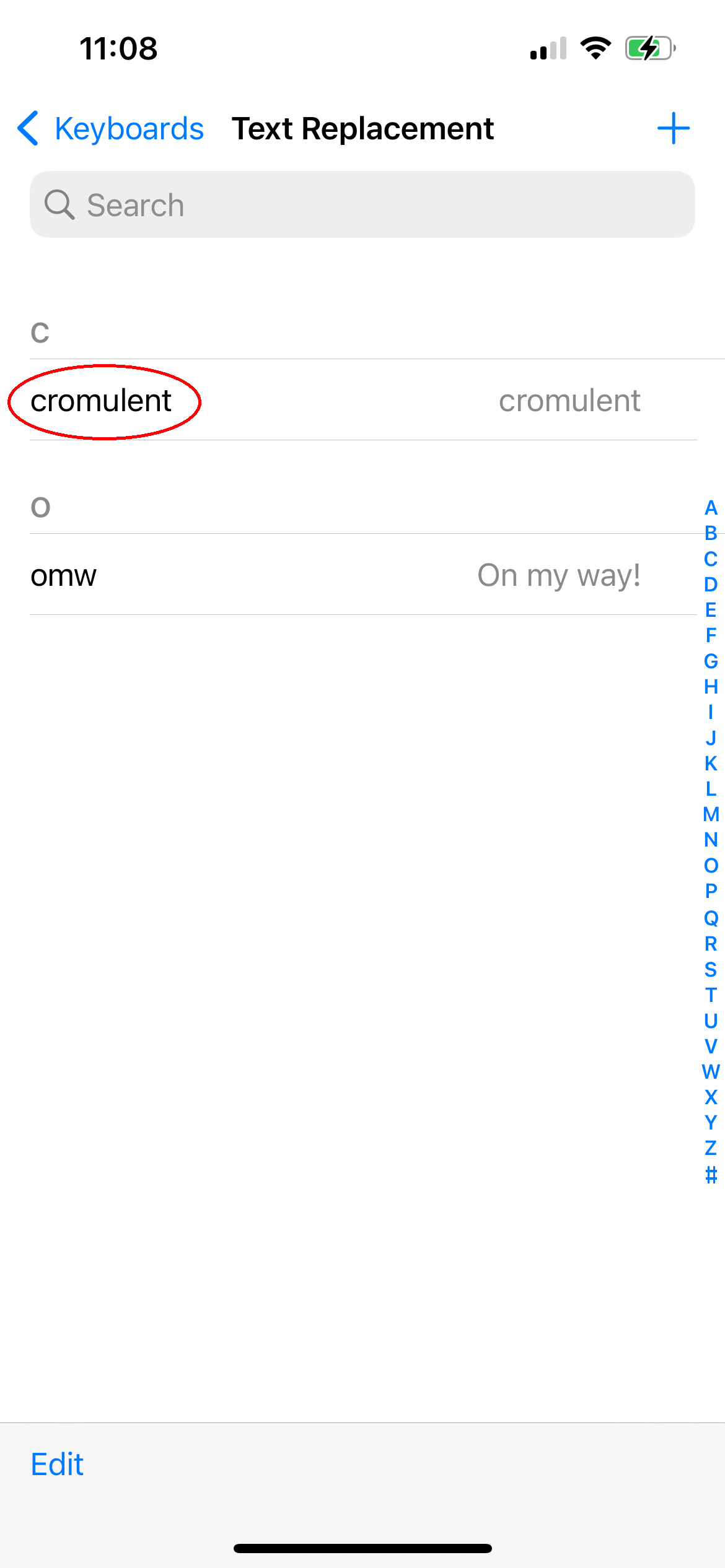
Once it’s been saved, your new word is in the dictionary and will no longer be auto-corrected to something else when typing on your iPhone

Troubleshooting
The most frequent reason would be that you use a slang word or an idiosyncratic spelling which is not recognised by the dictionary and is auto-corrected to something else. This is a way to get round that problem.
We used an iPhone 13, running iOS 16.